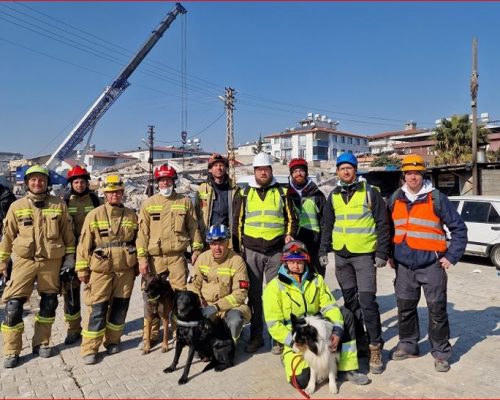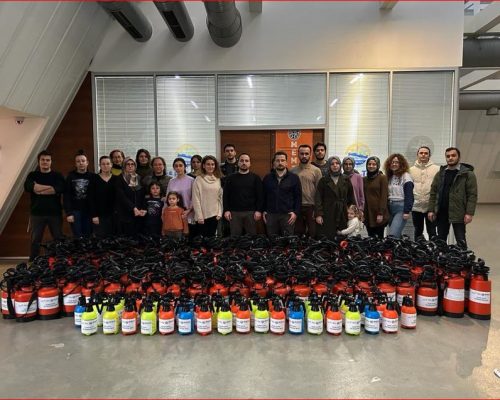Three weeks have passed since the ground trembled in Türkiye and Syria and rescue operations have given way to recovery plans and humanitarian aid. For EELISA, it has been a time for the realization of the need to give a joint response to the tragedy that has struck the country of one of our partners and how these sad events can unite us in solidarity.
Last Wednesday, 22 February, the EELISA Governing Board met with a main agenda item: to discuss and coordinate a joint response in memory of the victims of the earthquake in Türkiye and Syria and in support of the recovery efforts.
The Rectors, Presidents, and Directors of the Higher Education Institutions of the EELISA Alliance issued a Communiqué in solidarity with all the affected communities and declared Monday, 27 February a Day of Mourning for the victims. In this statement, the heads of the EELISA universities expressed their commitment to help alliance member İstanbul Teknik Üniversitesi (ITU) in meeting its urgent needs. They also encouraged their communities to contribute to a rapid reconstruction of damaged infrastructure.
Moments of silence honoring the victims of the earthquake in the Universidad Politécnica de Madrid (left) and Scuola Superiore Sant’Anna (right).
The board also agreed to task the EELISA Executive Board with working on a proposal for the design and implementation of a joint EELISA support action. These actions will aim helping students as well as the many academic and administrative staff who were affected by this catastrophe and will cover aspects such as scholarships to provide ITU students with learning materials and resources or technical, on-the-ground support to the affected areas.
Read the full Solidarity Statement HERE.
A key moment to share the state of the situation
During this meeting, the Rector of Istanbul Teknik Üniversitesi (ITÜ), Prof. Dr. İsmail Koyuncu, shared the latest updates on the situation, as well as a detailed presentation focusing on the emergency relief and support initiatives implemented by his University.
In his presentation, Rector Koyuncu shared images of the ITU community’s immediate response and the delivery of ten trucks of in-kind aid materials as well as pictures of groups of ITU scientists, mostly experts in fields such as civil engineering, geological engineering, geophysical engineering, and architecture, who traveled to the affected areas to make the measurements and observations needed to provide urgent technical support. He also explained how, with the aim to meet the most urgent needs of the devastated areas, ITU sent 253 water treatment modules to the region and conducted a blood donation campaign on campus with the Turkish Red Crescent. Rector Koyuncu also thanked EELISA partners Budapest University of Technology and Economics (BME), who sent a specialised force which, together with the ITÜ expedition, travelled to the disaster area to assess the damage.
He also presented two important software systems developed by ITU who have played an important role during the rescue actions – the app “Enkaz Dinleme Uygulaması”, by sound engineer Dr. Ozan Sarıer, one of the faculty members of İTÜ MIAM (Istanbul Technical University Center for Advanced Studies in Music) which serves to hear the voices of those under the debris without the need for the internet, and ITU Information Genome platform’s BEE’NOME, which is a Human Resources Analytics platform equipped with various matchmaking functionalities in different areas that allows the mobilization of ITU’s resources in a targeted way, in this case, a disaster response.
Dr. Koyuncu closed his intervention with the presentation of the “Earthquakes: Preliminary Report” developed by ITU academics – a compilation of preliminary geological, geophysical, geodetic, and geomorphological findings regarding the earthquake and the fault activity that included the evaluation of structural damages and the future implications for urban planning as well as construction techniques that can be used to meet the need for rapid housing.
SOME DATA RELATED TO THE SITUATION OF ITU STUDENTS
- Over 2.600 students whose families were in the Earthquake region, were reached by phone call.
- This action allowed them to 1596 students who responded that they are safe.
- 620 students were seriously affected by the Earthquakes, and their homes were destroyed.
- 209 students were partially affected by the Earthquakes. (Homes were not destroyed. Families were affected.)
- 3 students were injured and treated in hospitals.
- 4 students died due to the building collapse.
- Many students have several relatives & friends who passed away.
- 911 students require scholarships for this year, as their families cannot financially support them.
- 169 students need a computer.







